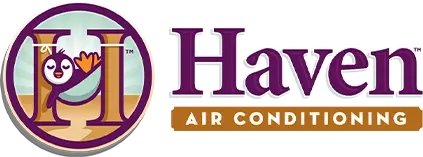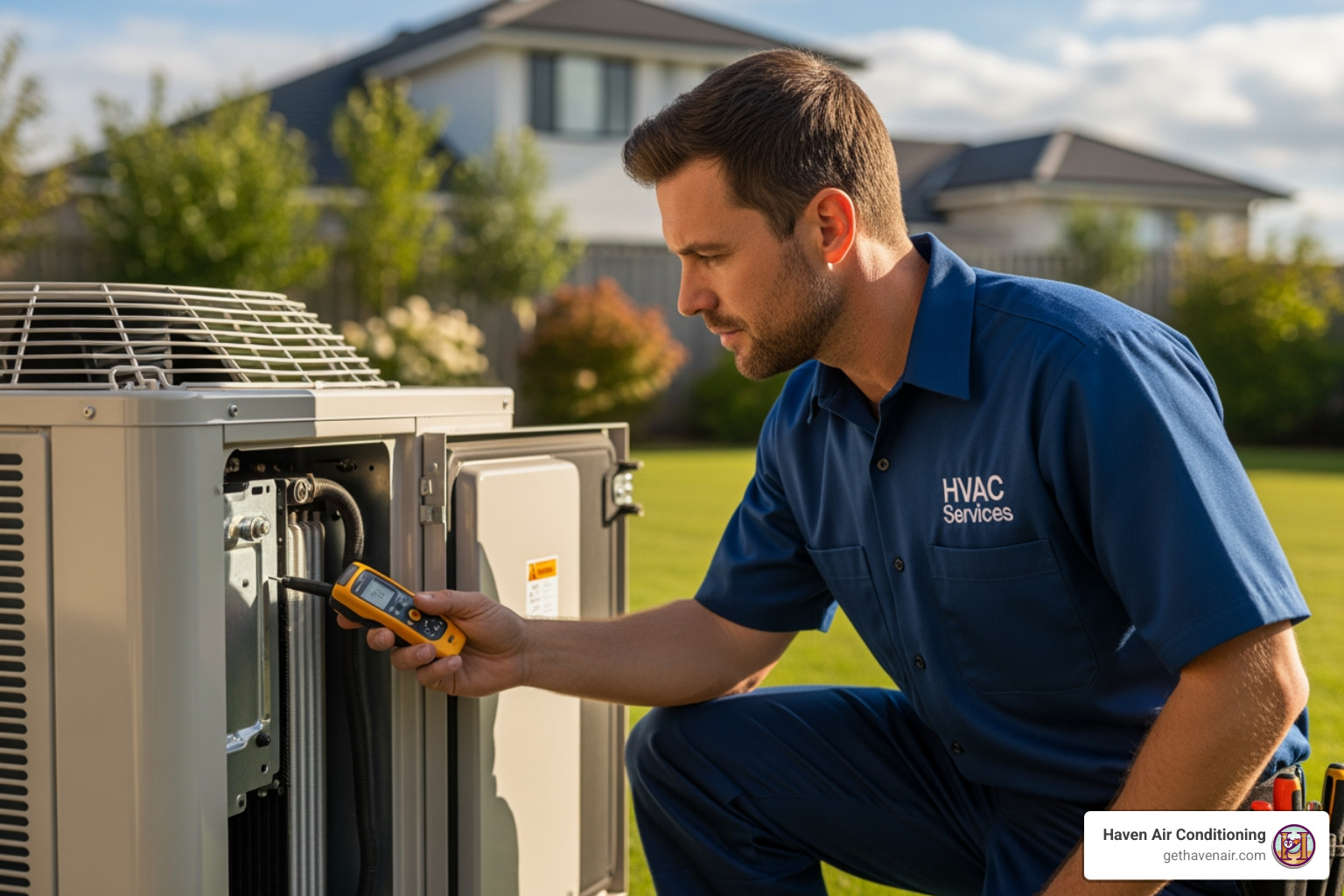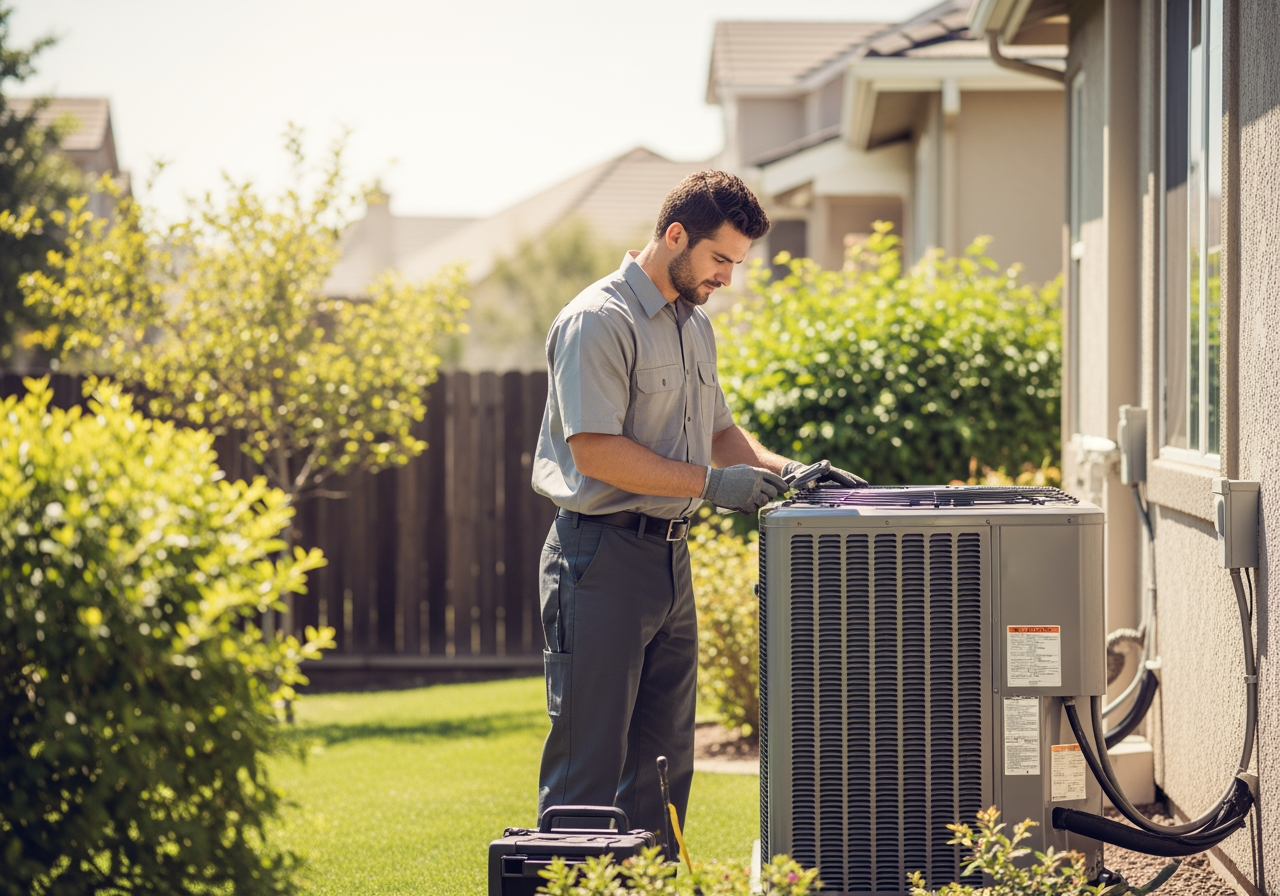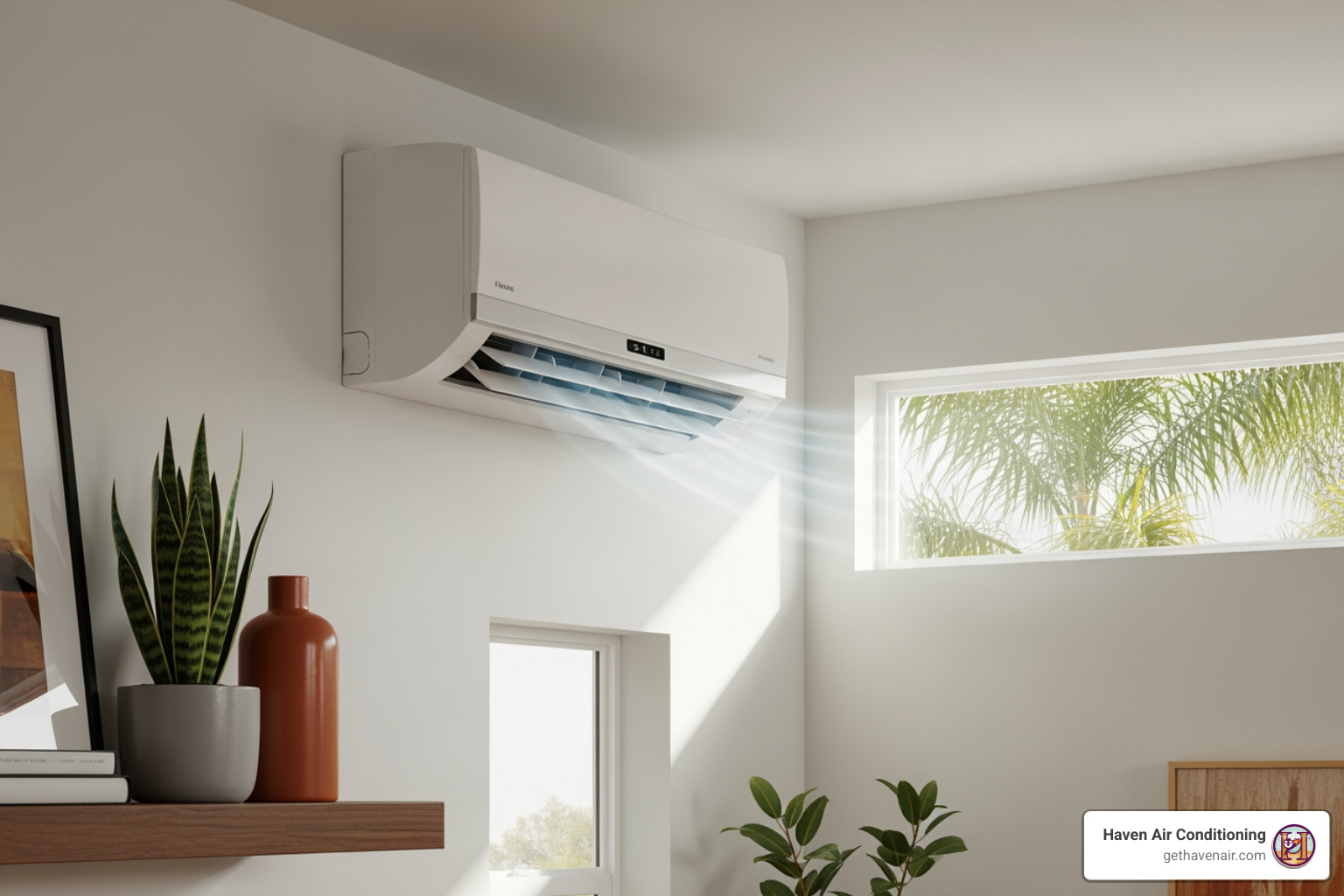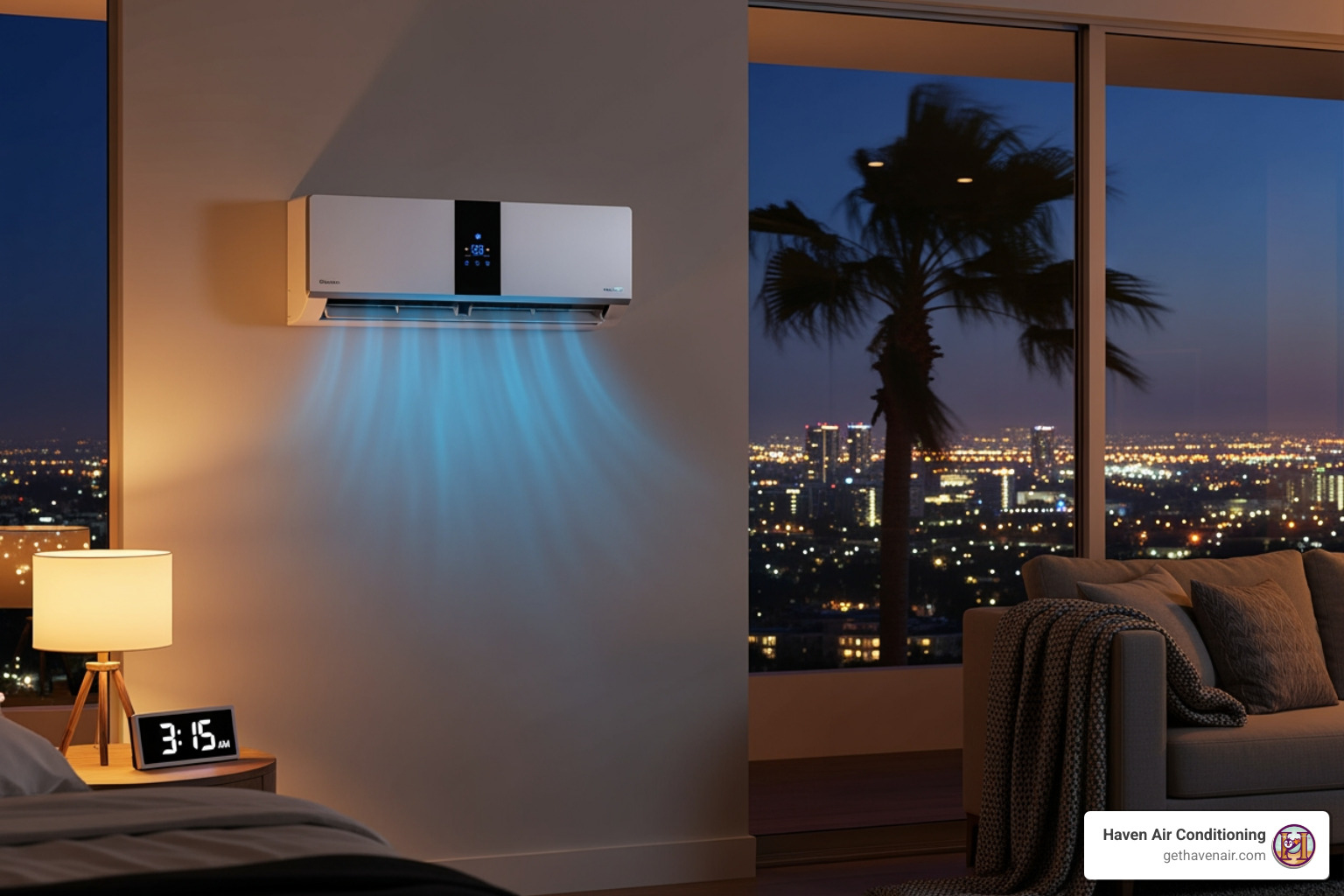The summer heat is certainly a concern for many residents in Orange County, CA, but it’s not the only thing to watch out for.
Air conditioners are a key component of a home’s cooling system. These devices remove the warm air from inside a room and pump it outside from the outdoor unit’s condenser coil. At the same time, they release cool air back into the room through cold evaporator pipes, making the inside temperature drop.
Just like all mechanical devices, air conditioners can sometimes experience problems. The most common issue is that the air conditioner stops blowing cold air.
In this case, you probably want to call an AC maintenance specialist. However, you are afraid of getting ripped off by some shady AC guy who will either overcharge you or leave your unit worse than before. But don’t worry! We’re here to help.
In this blog, we’ll cover why your AC might not be working and how to fix it. If you cannot find the source of the problem, or if it persists after taking these steps, then it is time to speak with an AC professional. Call our HVAC pro company in Orange County, Haven Air Conditioning!
Essential Components And Their Functions
- Compressor: This vital component circulates refrigerant throughout the system by compressing it into a high-pressure gas.
- Condenser: Responsible for receiving the compressed refrigerant from the compressor and cooling it down by releasing heat to the outside air.
- Evaporator Coil: Situated inside your home, this coil absorbs heat from indoor air as liquid refrigerant evaporates into a gas.
- Blower Motor: Pushes cooled air through ductwork and distributes it throughout your home.
- Thermostat: Controls temperature settings and signals when to turn on or off.
The Role Of Electricity In Powering Your AC
Your AC system relies heavily on electricity to power its various components. It’s crucial to ensure that there is an adequate power supply reaching your unit for proper functionality.
The Significance Of Regular Maintenance
Consistent maintenance plays a pivotal role in keeping your AC system operating smoothly. Routine inspections can help identify potential issues before they escalate into major problems that prevent your unit from turning on. By mastering these fundamentals about your AC system, you’ll be better prepared to troubleshoot any issues hindering its operation. Let’s delve into some common reasons why this might occur in section two.
Common Reasons Why Your AC Might Not Turn On
- Thermostat Malfunctioning: The thermostat is the brain of your AC system, so it stands to reason that a malfunctioning thermostat is one of the leading causes of AC problems. If your air conditioner won’t turn on, first check if the thermostat is set to “on” mode. Then, try adjusting the temperature setting to see if the AC kicks on. If the AC does not turn on, the problem is likely caused by the thermostat itself, so you’ll need to call a pro in AC repairs.
Low on Refrigerant: Low refrigerant is one of the most common reasons an air conditioner won’t turn on. If your AC unit is low on Freon, it can cause the unit to malfunction and prevent it from turning on.
To check if your unit is low on refrigerant, look for an icy coil. This is a sure sign that your Freon levels are low and need to be replenished. You can check for leaks in the refrigerant line if you don’t see any icy coils. You must repair the leak before adding more Freon to the unit.
Once you’ve repaired any leaks and topped off the Freon, your air conditioner should turn on and work properly.Clogged Air Filters: Another common reason an AC unit might fail to turn on is a clogged air filter. The air filter is responsible for trapping dirt, dust, and other airborne particles, so they don’t enter the unit and cause damage. Over time, the air filter can become clogged with debris, restricting airflow and causing the AC unit to work harder than it needs to. This can lead to several problems, including the unit shutting down completely.
If you suspect your AC unit’s air filter is the problem, you should first check it and replace it if necessary. Most air filters can be replaced relatively easily, and doing so will likely solve the problem and get your AC unit up and running again.
AC’s Capacitor Has Died: If your AC unit isn’t starting up at all, there’s a good chance that its capacitor has died. The capacitor is responsible for supplying the initial power to the motor. Over time, capacitors can wear out and no longer be able to provide an adequate charge. Replacing the capacitor is typically a fairly simple and inexpensive repair.
If you hear a clicking noise coming from your AC unit, it’s likely that the capacitor is the culprit. A clicking noise is usually an indication that the capacitor is trying to start the motor but isn’t able to.
Dormancy Issue: If your AC is unresponsive when you try to turn it on, there’s a good chance it’s simply in dormancy mode. Many modern air conditioners come with this feature, which essentially puts the unit to sleep when it’s not needed – saving you energy and money.
To “wake up” your AC, simply press the “on” button again. If it doesn’t respond, check your thermostat to ensure it is set to “cool” mode, and the temperature is below the current room temperature.
Dirty Condenser: Dirty condenser coils are one of the most common reasons your AC unit isn’t working. The function of the condenser coils is to release heat from the refrigerant. So if they are dirty, it prevents them from doing their job properly. Over time, the dirt and debris will build up and make it harder for the coils to release heat, which makes your AC unit work harder and can lead to a complete breakdown.
To clean the coils, you’ll need to turn off the power to the unit and remove the fan blade. Use a soft brush or compressed air to remove the dirt and debris from the coils. Rinse them thoroughly with water before turning the fan blade back on and turning the power back on.Tripped Circuit Breaker: One of the most common reasons your AC unit may not work is that it has tripped the circuit breaker. This usually happens when a power surge or spike overloads the system and causes the breaker to trip. The best way to fix this is to reset the breaker.
Old AC Units: If your AC unit is over 10 years old, it may be time to start shopping for a new one. Even with proper maintenance, AC units only have a lifespan of about 15 years. So if your unit is on the older side, it may just be time for an upgrade.
There are a few things you can do to troubleshoot your AC unit and see if it’s truly broken or just needs a little TLC. Start by checking the circuit breaker. If it’s tripped, simply reset it and see if that solves the problem. If not, look at the thermostat to see if it’s set properly. If it is, then the issue may be with the actual AC unit itself.Clogged Drain Pan or Line: A common issue preventing your AC unit from turning on is a clogged drain pan or line. If the pan is full of water, it will trip a switch that shuts off the unit to prevent it from overflowing and causing water damage. To fix this, simply empty the pan and clear any debris from the drain line.
Damaged Motor: If the engine of your AC unit is damaged, you will not be able to turn it on. This is because the motor is responsible for providing the power needed to start up and run the unit. If you think that your motor may be damaged, you should take it to a professional to have it repaired or replaced.
Faulty Power Cord or Outlet: If the cord that supplies power to your AC unit is damaged or frayed, it may not be able to provide enough liquid to turn on your unit. Check the power cord for any visible damage and replace it if necessary. If the cord looks fine, try plugging it into a different outlet to see if that does the trick.
The problem may be with the outlet itself if you have an older AC unit. Make sure that the outlet you are using is rated for 20 amps and that it is not controlled by a light switch. If the outlet is old, you may need to replace it.AC Not In the Right Size: If your AC unit is too small for your home, it will have to work overtime to cool the entire space. This can cause many problems, including the unit’s inability to turn on. If you think that your AC unit may be too small for your home, contact a professional to take a look. They will be able to tell you for sure and, if necessary, help you find a better-sized unit.
Power Issues: If your AC unit isn’t receiving enough power, it can cause the unit to malfunction. This could be due to a problem with the electrical supply to your home or an issue with the AC unit itself. If you suspect a power issue, check the breaker box and reset any tripped breakers. If that doesn’t work, call an electrician to have a look.
Check Your Thermostat: If your thermostat is set to “Off” mode, your AC unit won’t turn on. If it’s set to “Fan”, the unit will turn on but won’t actually cool your home. Ensure that the switch is in the “Auto” position so that your AC unit will turn on and cool your home as needed.
You may also want to check the batteries in your thermostat. If they’re low or dead, the thermostat won’t work properly and could cause your AC unit to malfunction.Air Conditioner Needs to be Reset: If your air conditioner doesn’t turn on, it may need to be reset. To do this, flip the thermostat switch from “Off” to “On” mode. If that doesn’t work, try turning its power off for about 30 seconds and then turning it back on.
Shut-off Switch: If your air conditioner doesn’t turn on, make sure that the shut-off switch near the outdoor unit is in the “On” mode. When it is in the “Off” position, it disconnects power to the air conditioner. To turn it on, simply flip the switch to the “On” position.
Inside Power Switch: There is also a power switch located inside your air conditioner. This switch is usually found near the furnace or air handler. If this switch is turned off, your air conditioner won’t turn on. Make sure that it is in the “On” mode before proceeding.
Blown Fuse or Transformer: One of the first places to check is your fuse box or electrical panel. If you have a central air conditioner, it will have its own dedicated circuit breaker or fuse. Look for a tripped breaker or a blown fuse.
If there is a blown fuse, replace it with a new one of the same amperage. If the breaker has tripped, flip it back on. If neither of these is the problem, you may have a blown transformer. This will require a professional to fix it
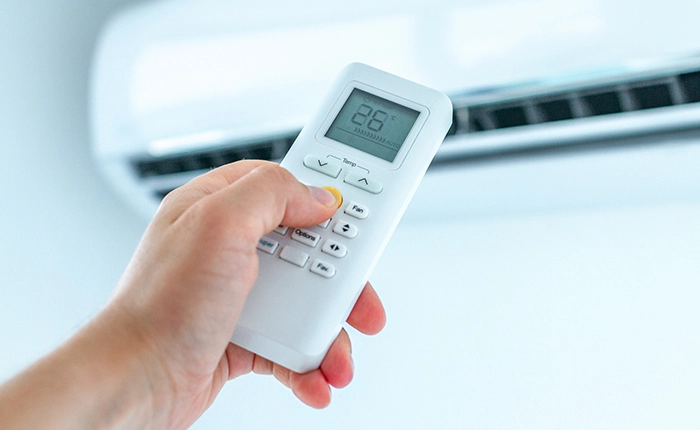
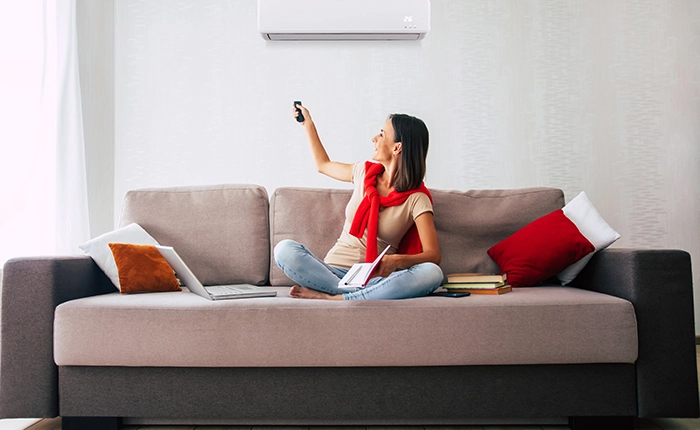
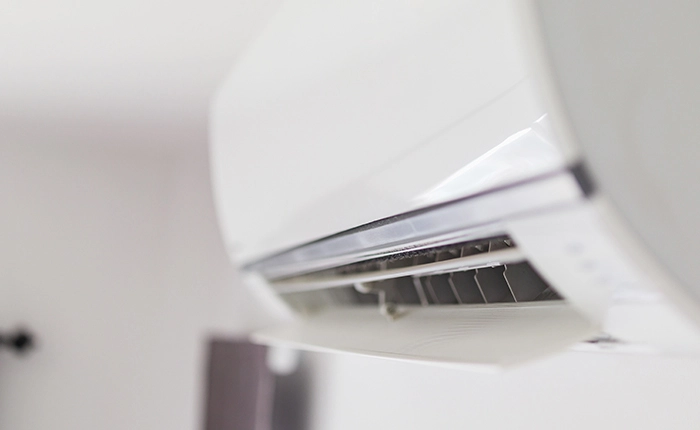


When To Call A Professional
To keep your air conditioner in top condition and prevent future issues, it’s crucial to take preventive measures. By following these steps, you can prolong the lifespan of your AC system and avoid costly repairs:
- Regular Maintenance and Cleaning: Schedule routine maintenance appointments with a professional HVAC technician. They will inspect your unit, clean the components, lubricate moving parts, and identify any potential problems before they escalate. Also, ensure that the area around your outdoor unit is free from debris such as leaves or branches.
- Timely Replacement of worn-out Parts: Over time, certain components in your AC system may wear out or become damaged. It’s essential to promptly replace these parts to prevent further damage or inefficiency in the system. Consult with an HVAC professional who can assess which parts need replacement based on their condition.
- Proper Use of Thermostat and Other Controls: Use your thermostat wisely by setting appropriate temperatures for different times of the day or when you are away from home. This helps reduce unnecessary strain on the system while still maintaining a comfortable indoor environment.
- Ensuring Adequate Power Supply: Make sure that your AC unit is connected to a dedicated electrical circuit with sufficient capacity for its power requirements. If you have recently added new appliances or electronics that draw significant power from the same circuit as your AC unit, consider having an electrician assess if an upgrade is necessary.
By implementing these preventive measures, you can minimize future problems with your air conditioning system and enjoy uninterrupted comfort throughout the hot summer months. Remember that while some troubleshooting steps can be done by homeowners themselves, it’s always best to consult with a professional HVAC technician for complex issues or if you’re unsure about performing any tasks yourself.
If you’ve tried all these tips and your AC is still not working, it’s time to contact a local HVAC pro. Call Haven Air’s team of AC experts in Orange County, California, and we’ll help you get to the root of the problem. Check our AC repair services in Orange County.
